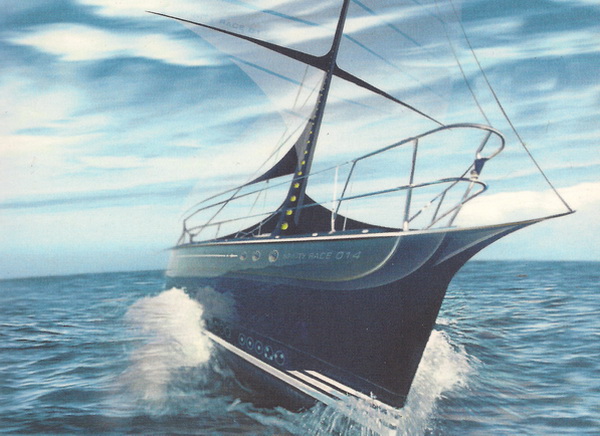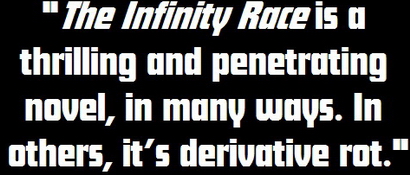|
| |
|
STORY PLACEMENT THIS STORY TAKES PLACE BETWEEN THE NOVELS "TIME ZERO" AND "THE DOMINO EFFECT."
WRITTEN BY SIMON MESSINGHAM
RECOMMENDED PURCHASE OFFICIAL BBC 'EIGHTH DOCTOR' PAPERBACK (ISBN 0-563-53863-5) RELEASED IN NOVEMBER 2002.
BLURB The Doctor is in DEEP trouble. Stuck in a parallel dimension, pursuing THE SINISTER Sabbath, he must TRY TO unravel a complex plot in which he may
be
a pawn.
TARDIS MATERIALISES on Selonart, A planet famed for the unique, friction-nullifying water that covers its surface - A water that propels GIGANTIC, technological yachts across its waves at inconceivable speeds IN A GREAT REGATTA.
win the race? Who is Bloom, the enigmatic
Selonart
native? the Doctor realises that he is AT RISK OF engineering his own downfall. AND THAT IT MIGHT ALREADY BE TOO LATE... |
|
|
The Infinity Race NOVEMBER 2002
Simon Messingham’s fourth novel for BBC Books, The Infinity Race, is probably the most divisive of the lot. Not only does it seem to prompt polarised opinions from different readers, but it often does so within an individual reader too. I, for instance, love it and loathe it in fairly equal measure.
Following on directly from the events of Time Zero, as the story begins the Doctor and his companions are adrift in an aberrant timeline, frantically searching for clues that might reveal the whereabouts of Sabbath. In a roundabout fashion, their pursuit leads them to the planet Selonart – a distinctive world carpeted in low density water, whose inhabitants race across its oceanic surface at high speeds in frictionless yachts. The TARDIS materialises aboard such a yacht, one that just happens to be competing in the Fourteenth Trans-Global Regatta, where the Doctor and his friends discover a body strapped to the wheel and monsters on the prowl…
The maritime setting is reminiscent of Barbara Clegg’s Enlightenment, albeit with a more traditional edge. The alien world and particularly the unusual properties of its water lend the proceedings more of a straight-up science fiction feel than Clegg’s ‘sailing ships in space’ premise did, and to his credit Messingham does an almost Mortimore-esque job of selling his incomparable environment through his scrupulous prose.
The most arresting thing about The Infinity Race though is its delivery. Whilst I realise that it’s tremendously unpopular amongst many readers, I’ve always been a keen proponent of first person narration, and here the author wields the device to terrific effect. Anji’s passages are extraordinarily engaging, particularly as these events take place soon after her decision to leave the Doctor and go home, only for destiny’s cruel hand to intervene and land her in another reality altogether. It’s like a warped, angst-fuelled Companion Chronicle, awash with self-interested scheming, panic attacks and sexist belittlements. For me, this forceful narration papered over the numerous cracks in the plot – I strongly suspect that had the tale been relayed in even the most polished omniscient prose, I’d quickly have lost interest in it.
being one of the author’s best. Of all the places he might have turned for inspiration, Robert Sloman’s Mutants should have been down towards the bottom of the list. Admittedly, the trans- figuration of the locals is pulled off with greater assurance here than it was in the execrable six- parter, but it’s still below par, particularly when we take into account that Messingham had a whole new timeline to play with. When gifted the opportunity to rewrite the rulebook, why just reiterate Earth Empires, corrupt corporations and abhorrent administrators?
Worse still is the author’s portrayal of Sabbath. Right from his debut in The Adventuress of Henrietta Street, it was made very clear that he was to be a new breed of nemesis; one with sufficient complexity to avoid the clichéd ‘Master’ pitfalls and pratfalls. Lawrence Miles even went so far as to give the Master a veiled cameo in that tale to make the distinction between the two characters explicit. Here, however, Sabbath is portrayed simply as being the Master by another name; a gullible catspaw who’s ultimately hoist by his own petard.
Even more contentious though is Messingham’s portrayal of the Doctor. At times, he seems to absolutely nail the amnesiac Elemental, particularly when we are made privy to his ad hoc planning, yet at others he’s drawn so far wide of the mark that its beggars belief. His reaction to apparently having killed Sabbath, for instance, would be out of kilter for any of the Doctor’s incarnations, and especially the eighth. Rather than build upon the exceptional relationship between the two men, as I suspect was intended, the Doctor’s hard-hearted pleasure at his rival’s evident demise seems to actively debase it.
The Infinity Race is a thrilling and penetrating novel, in many ways. In others, it’s derivative rot brimming with flagrant mischaracterisation. This makes it difficult to take a firm view on, as one page can have you rolling your eyes while the next will evolve to confound you. Yet picking up as it does from Time Zero, it’s not a book that one can really afford to skip over
if following the story through, so just make sure that when reading it,
you’re prepared to run into a timeberg or two along the way.
|
|
|
Copyright © E.G. Wolverson 2010
E.G. Wolverson has asserted his right under the Copyright, Designs and Patents Act, 1988 to be identified as the author of this work. |
|
|
Unless otherwise stated, all images on this site are copyrighted to the BBC and are used solely for promotional purposes. ‘Doctor Who’ is copyright © by the BBC. No copyright infringement is intended. |
|

.jpg)
.jpg)

 Indeed,
the narrative is far from
Indeed,
the narrative is far from